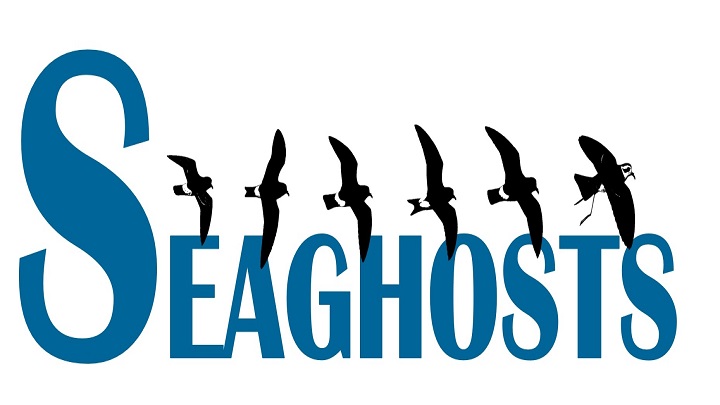The University of Barcelona is leading one of 33 European projects to improve the monitoring of biodiversity and ecosystem change
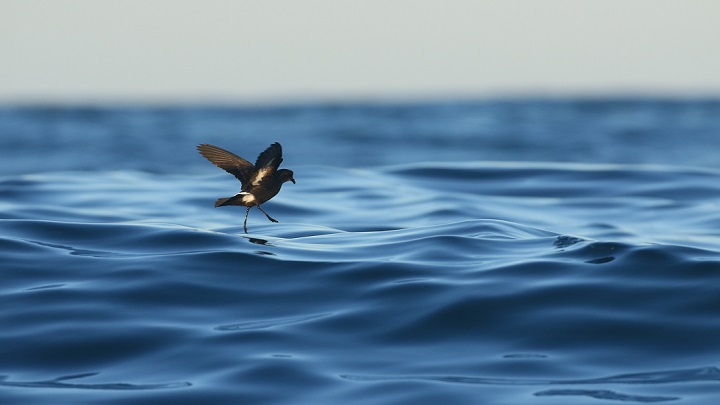
The main objective of SEAGHOSTS, one of the 33 European projects selected under the BiodivMon call and coordinated by Professor Raül Ramos, from the Faculty of Biology and the Biodiversity Research Instiute of the University of Barcelona (IRBio-UB), is to understand the threats affecting the conservation of northern storm petrels and improve the protection of these birds’ populations on a European scale.

The main objective of SEAGHOSTS, one of the 33 European projects selected under the BiodivMon call and coordinated by Professor Raül Ramos, from the Faculty of Biology and the Biodiversity Research Instiute of the University of Barcelona (IRBio-UB), is to understand the threats affecting the conservation of northern storm petrels and improve the protection of these birds’ populations on a European scale.
SEAGHOSTS also stands out as one of the six projects funded by state institutions in the framework of the call, aimed at improving the monitoring of biodiversity and ecosystem change in the European framework. Specifically, the project will receive funding of more than two million euros to address the challenge of gaining an in-depth understanding of the world’s smallest seabirds, the storm petrels.
All the selected projects will be funded by the European Biodiversity Partnership (Biodiversa+), a consortium that promotes research excellence to protect biodiversity and is financed by the Biodiversity Foundation of the Spanish Ministry for Ecological Transition and the Demographic Challenge. In this European call, the UB is also a partner of the DNASense project, led by the University of Stockholm (Sweden) and with the participation of Professor Owen Wangensteen, from the Faculty of Biology and IRBio.
Storm petrels as bioindicators
To effectively conserve global biodiversity, “it is necessary to understand the spatial ecology of wildlife in the wild. The main objective of the SEAGHOSTS project is to deepen our knowledge of the global spatial ecology and conservation of storm petrels (Hydrobatidae and Oceanitidae), and to assess the main anthropogenic impacts they face in the marine ecosystems of the European coastline: climate change, renewable energies, aquaculture and exposure to microplastics”, says Raül Ramos, member of the UB’s Department of Evolutionary Biology, Ecology and Environmental Sciences and coordinator of SEAGHOSTS.
“The project aims to address gaps in knowledge about marine biodiversity by combining available monitoring data — demographic, morphological, genetic and trophic — with new data that will be acquired during the project, thus complementing sampling across Europe. This knowledge will also contribute, in a more robust and specific way, to the definition of the different Conservation Units (CU) of storm petrels that inhabit our European seas”, the researcher explains.
The project, which will be deployed over the next three years, involves a total of sixteen partners from ten European countries (Spain, Denmark, Germany, Portugal, Greece, Norway, Italy, France, Ireland, Iceland) as well as one each from the United States and Canada.
The human footprint is unevenly distributed across oceans and across different political boundaries, but its impact on the marine environment has been little studied. This lack of knowledge, for example, often hinders the EU’s commitment to the UN Sustainable Development Goals (UN-SDGs). While European society is particularly sensitive to green transition processes to mitigate global changes, the large investment in low-carbon technologies and the rapid shift towards renewable energy sources (e.g. offshore wind and solar farms) can also have very damaging impacts on marine environments.
“Storm petrels are excellent sentinels of the marine ecosystem: they are highly pelagic, travel long distances over the sea, feed mainly on plankton, are very long-lived despite their small size and are extremely sensitive to anthropogenic threats in general. Until now, their body size and elusive behaviour have been a major limitation to their study”, says Raül Ramos.
Knowing the migratory routes of the storm petrels will allow the identification of threats and the marking of hotspots of renewable source installations that may affect migratory bird populations. In particular, it will identify hotspots not covered by the current network of Marine Protected Areas (MPAs), edit sensitivity maps of various anthropogenic impacts and contribute to defining more precise Conservation Units (CU).
Studying biodiversity with cutting-edge techniques
Some of the methodologies the SEAGHOST project will apply to determine the movements and wintering distributions of six migratory stormbird species —including the smallest ones — are: ultra-miniaturised geolocation devices, habitat modelling, stable isotope analysis, DNA metabarcoding analysis, geometric morphometry, and microplastic characterisation.
SEAGHOSTS will provide an innovative and critical current perspective on anthropogenic impacts on the marine environment — in particular, how these impacts affect almost forgotten species — that will be key to better management and conservation of marine biodiversity.
Multimedia gallery
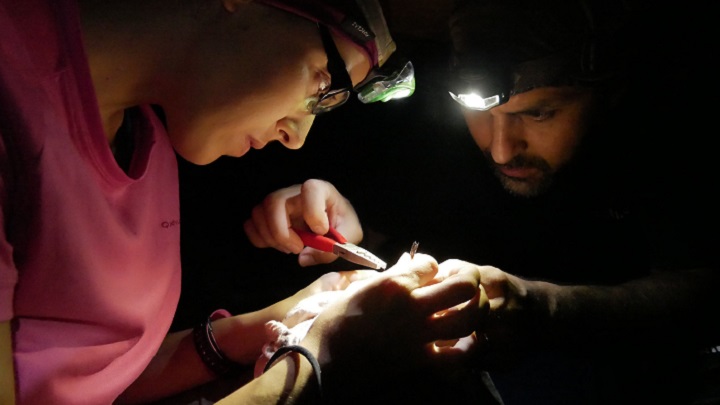
Teresa Militão and Raül Ramos during the fieldwork. Credit: Raül Ramos
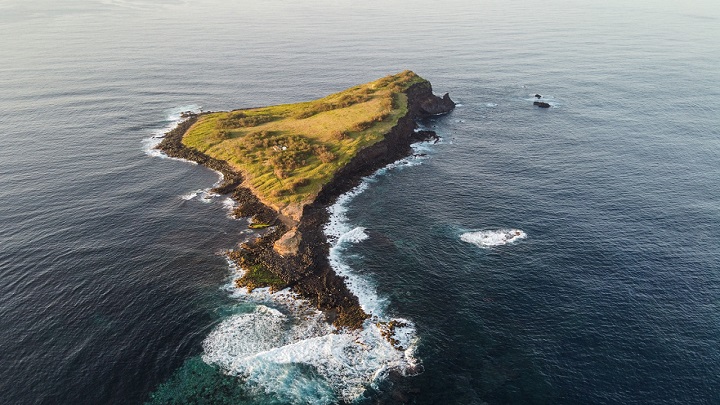
SEAGHOSTS will receive funding of more than two million euros to address the challenge of gaining an in-depth understanding of the world’s smallest seabirds, the storm petrels.
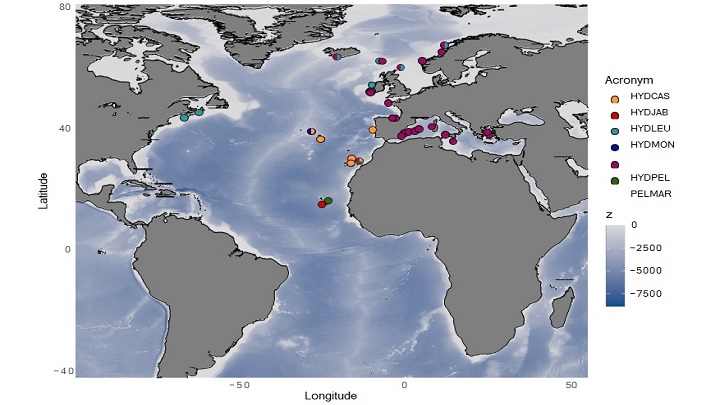
Aerial view of Praia Islet (Azores, Portugal). Credit: Ben Porter
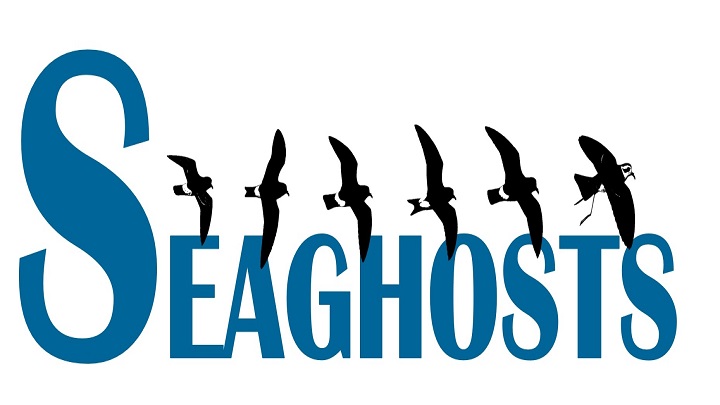
The project, which will be deployed over the next three years, involves a total of sixteen partners from ten European countries as well as one each from the United States and Canada.
